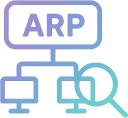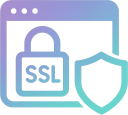Powerful Features for Every Network Analyst

Explore HTTP data and headers
Deep packet inspection allows you to dive into HTTP communications. Explore HTTP requests and responses. Web servers information and payloads, collect forms data and analyze transferred content.
Wonder to view established HTTP sessions and users credentials? Find transferred files including office documents? Use A-Packets network traffic analysis and integrated pcap file viewer.
Analyze pcap file to investigate HTTP data in details. View network traffic, rebuild client‑server communications step by step.

Locate network devices
You can effortlessly build pcap visualisation for network communications. Explore network devices map and all communications between nodes. Classify network nodes by their type through pcap analysis. Visualize TCP/UDP communications from pcap file with network graph.
Quick read pcap files to detect DNS, DHCP and LDAP servers and sniff captured DNS requests in pcap file. A-Packets uses passive fingerprinting to detect running network services and open ports.
Devices map displays network traffic for popular protocols. It allows explore communication links between network nodes using various filters.

Collect WiFi data
View wireless networks information extracted from pcap file. You can find Access Points and their SSIDs (network names). Reveal previously‑associated networks for client devices using probe requests.
You can also recognize multicast traffic to find used network protocols and services.
Detected WPA/WPA2 handshakes in analyzed pcap file will be converted to .hccapx. This file you will use to recover password with Hashcat.

Discover and retrieve images, office documents, and more with pcap reader
Pcap reader allows detect and extract pictures. View office documents and other file formats found during analyzing of uploaded pcap file. You can quick preview found files in network traffic and download them.
Comprehensive pcap file analysis is able to find most popular document formats in HTTP flow.

Uncovering LAN insights and user credentials from SMB and NetBIOS broadcast packets
SMB and NetBIOS broadcast packets provide a lot of information about LAN structure. You can extract from pcap file usefull information like OS, roles and admin comments
Another one interesting thing could be found in SMB communicsations is users credentials. Like NTLMv2‑SSP authentication between nodes. Upload pcap file and you can try to crack found hashes with appropriate tools.

Dive into DNS, mDNS, and NBNS protocols to unearth network structure and service activities
You can explore protocols DNS, mDNS (Multicast DNS) and NBNS (NetBIOS Name Service). Gather information about network structure and activities of running services.
Use filters to separate DNS traffic by type. Analyze queries and responses from target servers. Find Multicast/broadcast addresses (in case of mDNS and NBNS).

Unlocking device topology and anomalies with ARP (Address Resolution Protocol) analysis
ARP (Address Resolution Protocol) messages contains valuable information about devices topology. It uses MAC addresses on Layer 2 (OSI). You can elicit device‑IP accordance directly from ARP requests and responses. Investigate gratuitous ARP messages during devices boot.
Basic automatic analyze enables to detect various anomalies in ARP communications. Detect routers and smart switches and WiFi access points integrated into LAN. It is possible to detect malicious activities like ARP spoofing nodes.

Password and hash discovery across multiple protocols
A-Packets scans uploaded pcap file for various protocols to find user credentials. You can find plain text passwords in authorization headers or detect cryptographic hashes. The service is also looking for complex challenge‑base auth protocols.
You can extract passwords/hashes from protocols:
- HTTP Basic/Digest/Negotiate
- SIP Digest
- NTLMv1/v2 (SMB)
- Kerberos
- LDAP
- SNMP, IMAP, SMTP
- Postgres, MSSQL (TDS 7.0+)
- Telnet and FTP sessions
You can restore original passwords from obtained hashes with any hash-cracking tool.

Automate and schedule PCAP file analysis with our API for effortless network insights
By using the API, you can automate the process of uploading pcap files and parse them to extract useful information. This allows you to efficiently analyze large volumes of network data without requiring manual intervention for each individual file.
One key advantage of using the API for pcap file analysis is the ability to schedule the process. This means that you can set up a regular schedule for uploading and analyzing pcap files, ensuring that you always have up‑to‑date information about your network traffic. The APIs can help you streamline your network analysis process and gain insights into your network's performance and security.

Enhanced network security with SSL/TLS session analysis tool
Our tool parses pcap files to extract SSL/TLS session information, which can be used to detect attacks, identify self‑signed and expired certificates, and perform other security‑related analyses.
You can view detailed information about each session, including the source and destination IP addresses, the protocol version, the cipher suite used, and any certificate information. Additionally, our tool can identify anomalies in SSL/TLS traffic, such as unexpected cipher suites or expired certificates, helping you to detect potential attacks or configuration issues.
Overall, our SSL/TLS diagnostic tool is an essential tool for anyone involved in network security. Whether you are a network administrator, security analyst, or researcher, our tool can provide valuable insights into SSL/TLS traffic that can help you identify and mitigate potential threats.

Stay ahead, stay secure: Introducing advanced event detection
Elevate Your Network Security: Introducing our game-changing feature - Advanced Event Detection. Safeguarding your network is no longer a reactive endeavor. Stay ahead of the curve by identifying abnormal events like network scans, cyber attacks, and SSL/TLS certificate expirations in real time. With instant email alerts, you're empowered to take immediate action, ensuring your network remains fortified.
Efficiency Meets Vigilance: Seamlessly integrating into your workflow, Advanced Event Detection automates the process of analyzing uploaded pcap files. This means you can focus on strategic tasks while our technology works tirelessly in the background. Whether it's passwords over insecure channels or potential breaches, our comprehensive approach keeps you informed and in control. Elevate your network security today and experience proactive protection like never before.